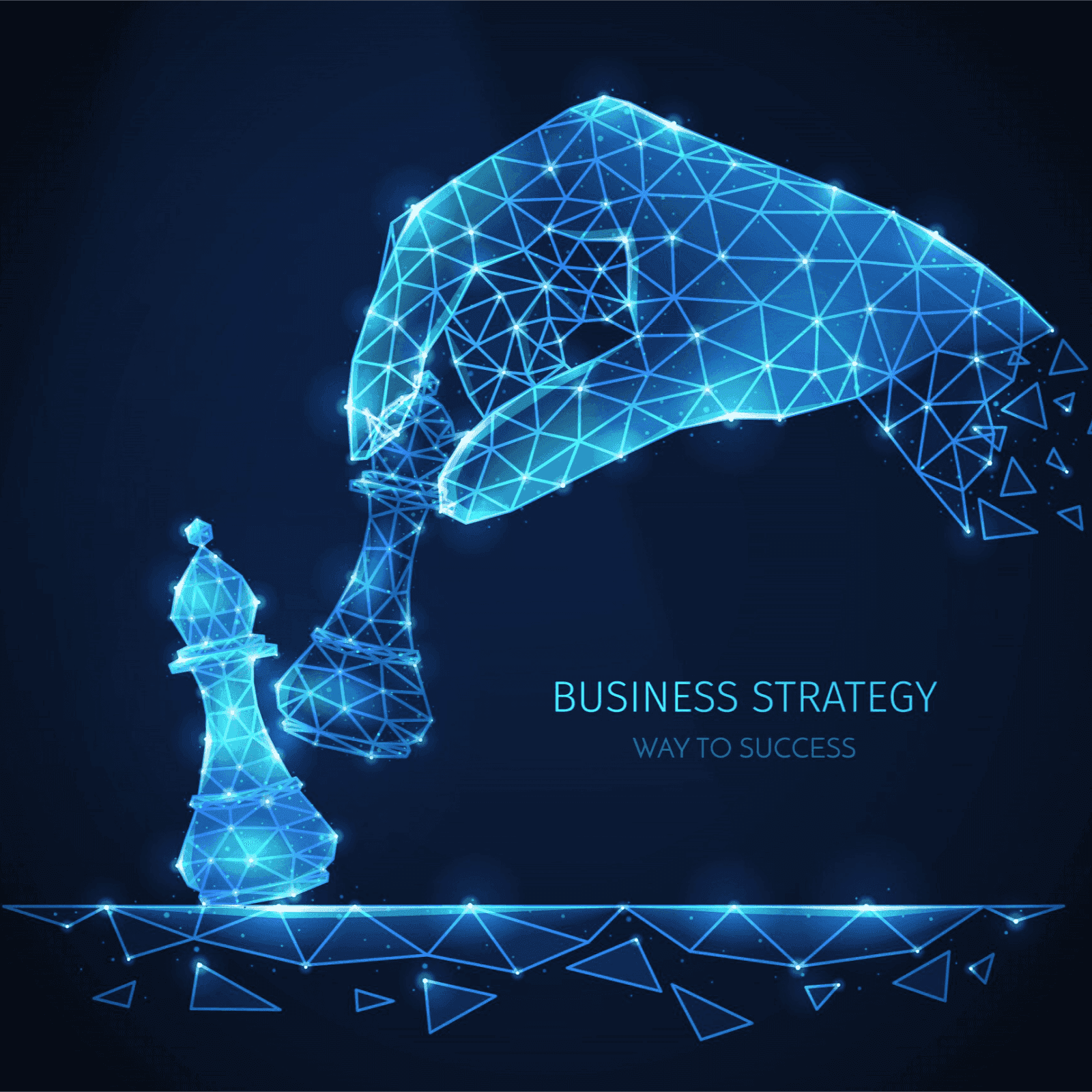
BUSINESS CONSULTING
26 May 2025
What Is Business Strategy & Why Is It Important?
No matter the industry, size, or market—every business needs a clear vision to grow and generate profits. Business strategy is the long-term plan that companies follow to achieve their goals, such as market share, revenue, or cost reduction.
In this article we will find out why the right strategies steer international companies toward successful paths. They can help during the decision-making process by choosing what to do and how to do it regarding resource allocation and competitive positioning.
What Is a Business Strategy?
But what is a business strategy in simple terms? It is a long-term plan of action that guides a firm toward achieving specific goals. Rather than focusing only on daily operations or quarterly outcomes, a business strategy outlines how an organization will compete, deliver value, and grow over time.
A solid strategy connects three essential elements: the company’s mission, internal capabilities, and the external market environment. In this way it integrates these three aspects in order to create a single model consistent with its objectives. Whether the goal is expansion into another market or innovation, it is essential to adapt the strategy to the context in which you operate and based on your internal resources.
What Is the Difference Between Corporate and Business Strategy?
Understanding what is a business strategy allows us to analyze a business’s plans. In fact, a business strategy outlines what the organization decides to do as well as what not to do to gain a competitive advantage. But what exactly does this mean?
Within the strategy are various aspects such as the idea, resulting goals, and allocating resources (human, technological, and financial) needed.
Corporate strategy chooses which markets or countries to operate in by evaluating the whole business and not individual divisions. On the other hand, business strategy focuses on achieving its programs through marketing, production, distribution, etc.
Why Business Strategy Matters
An effective business strategy equips the business with structure and direction. In fact, it supports:
- Long-term growth: A clear vision of the future enables the planning of steps to achieve the desired outcomes sustainably;
- More informed investment decisions: Having a clear strategy makes it easier to decide where to transfer programs;
- Risk management: With accurate market and competitor analysis, it is also possible to mitigate possible risks by anticipating threats;
- Linking strategy and sustainable performance: Strategies allow you to “predict” the future by avoiding challenges and building stable and lasting business growth over time.
This is why relying on a business consultant like Ascot International can be the right choice for business development.
Key Components of a Business Strategy
Business strategies are based on specific assets. The main ones are:
- Corporate mission and vision: Respectively the purpose and future goal of the organization. A clear mission allows the company’s identity to be guided parallel to its strategy while the vision serves as the cornerstone for all decisions.
- Market analysis: This is the basis for building strategies through data and services such as market trends, competitor analysis, opportunities, and threats.
- Value proposition: This is where the firm explains to customers why they should choose the organization. Company values, product or service benefits, exclusivity, etc., are part of the value proposition and can be especially important when choosing a business consultant.
- Competitive advantage: Every company needs to understand and define what it excels at compared to its competitors. Advantages can come from lower production costs, better-perceived quality, customer experience, innovation propensity, etc.
- Business goals: All business plans must be clear, precise, and measurable so that processes and progress achieved can be evaluated.
- KPIs (Key Performance Indicators): Defining clear KPIs allows the firm to monitor performance trends closely. These numerical indicators enable the company to analyze performance concretely by adjusting courses if necessary.
- Resource planning: Finally, successful business strategies need proper resource planning. When we talk about resources, we are not only talking about finances but also technological and human resources.
Sound planning ensures efficiency and a solid strategy over time.
Types of Business Strategies
Of course, there is no one strategy better than others. However, each company can adopt one that effectively suits its goals.
- Cost leadership: This strategy aims to gain a competitive advantage by providing lower prices than competitors. Not to be confused with transfer pricing, which is another topic. It is mainly used by large retailers.
- Differentiation: Instead, in this case, the company aims to differentiate itself from competitors by providing one or more specific features such as high quality, iconic design, branding, etc. Typically used in saturated markets where the public is willing to spend more on unique features (fashion, technology, luxury).
- Niche strategy: Here the proposition is unique and focused on a specific niche. It is a variant of both differentiation and cost leadership. Used mainly in industries with specific needs (software, food, etc.).
- Growth strategies: The company aims to expand into existing markets and regions or expand its range of products and services. Requires large investments and strong partnerships. It is used by startups or high-growth companies.
- Innovation: Typical of technology but also in all areas where innovation is needed or necessary to get ahead of competitors.
How to Build a Business Strategy
Creating an effective strategy involves a structure approach:
- Analyze the internal and external environment — Tools like SWOT (Strengths, Weaknesses, Opportunities, Threats) and PESTLE (Political, Economic, Social, Technological, Legal, Environmental) help assess conditions.
- Define objectives — These should be specific, measurable, and aligned with long-term purposes.
- Choose a competitive approach — Whether cost, differentiation or focus, it must reflect the company’s capabilities.
- Aling resources and operations — Ensure people and processes support the chosen path.
- Monitor and adapt — Use KPIs to evaluate progress and refine strategy as needed.
Leadership involvement is critical at every stage, as alignment across departments ensures consistent execution.
Global Considerations in Business Strategy
Companies operating across borders have additional elements to consider when developing a business strategy. Given the increased complexity, due consideration must be given to regulatory and cultural differences in markets since they affect every aspect of marketing and management.
In addition, supply chain issues (higher operating costs, logistical difficulties), competition in the region, and global branding must also be considered. The right balance between international consistency and local flexibility can be a competitive advantage. The last aspect concerns currency risks and policies on foreign investment.
Examples of Successful Business Strategies
Several global companies have demonstrated the power of well-executed business strategies:
- A European tech startup used a growth strategy to expand into Southeast Asia by providing simplified online digital services for small enterprises.
- A U.S.-based luxury fashion brand maintained its global identity while adapting campaign messaging and product presentation to different regional preferences.
- A SaaS company targeting emerging markets adopted a product-led approach—providing basic features gratis and upselling expensive digital services once users were engaged.
Common Mistakes to Avoid in Business Strategy
A well-designed plan can fail if not followed properly. Some of the most common mistakes include:
- Lack of clear direction: It generates confusion and lead to inconsistent choices;
- Misalignment between plans and resources: Resources must be proportionate to programs’ ambitions;
- Inability to adapt to the markets: Strategies must adapt to innovations, new competitors, and trends;
- Underestimation of external risks: Every choice must consider geopolitical, economic, and regulatory factors;
- Overstating complexity: The strategy must be clear, precise, and pragmatic.
FAQs
What is business strategy?
Business strategy is a plan by which the firm decides what to achieve and how to achieve it by creating value.
Why is a business strategy important?
Because it dramatically increases long-term success through clear plans and established decision-making.
How is a business strategy different from a business plan?
A business plan includes only operational details while a business strategy is a long-term plan of what to achieve and how to do it.
Can small businesses use business strategy frameworks?
Yes. Business strategies are essential for companies of all sizes to achieve operational clarity.
How often should a business strategy be updated?
Whenever necessary or significant changes occur in the market. As a rule, companies check and update it annually.
References
Grant, R. M. (2021). Contemporary Strategy Analysis: Text and Cases Edition (11th ed.). Wiley.
https://www.wiley.com/en-us/Contemporary+Strategy+Analysis%2C+11th+Edition-p-9781119815211R150
Johnson, G., Scholes, K., & Whittington, R. (2020). Exploring Strategy: Text and Cases (12th ed.). Pearson Education.
https://books.google.rs/books/about/Exploring_Strategy_Text_and_Cases_12th_E.html?id=GeksEAAAQBAJ&redir_esc=y
Barney, J. B., & Hesterly, W. S. (2019). Strategic Management and Competitive Advantage: Concepts and Cases (6th ed.). Pearson.
https://www.pearson.com/en-us/subject-catalog/p/strategic-management-and-competitive-advantage-concepts-and-cases/P200000005821/9780136878674

Business Formation
27 May 2025
What is a Wholly-Owned Subsidiary?
A wholly owned subsidiary is a separate company entirely controlled by a parent company. Unlike other subsidiaries, it allows for greater control and faster decisions. In this article we will see why this form of company is so widely used worldwide. What is Wholly-Owned Subsidiary? What is a wholly owned subsidiary? It is a company […]

Business Formation
26 May 2025
A Guide to International Business Registration
International business registration is the process of forming companies in a different jurisdiction. It’s strategically vital to ensure that you approach the process correctly. Whether you’re an entrepreneur with growth aspirations or plans to develop a multinational, proper registration affords the opportunity to take full advantage of fresh markets. This can be complex, so we’ve […]




